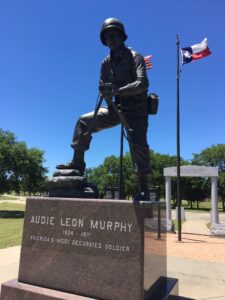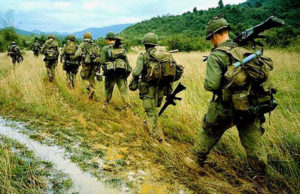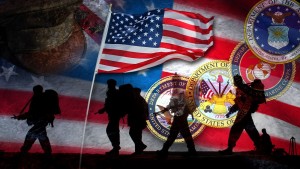BLOGGER’S NOTE: This item was published initially on KETR.org, the website for KETR-FM, the public radio station based at Texas A&M University-Commerce.
This much is likely true: When you go off to war and then distinguish yourself by becoming the most highly decorated soldier in your nation’s history, communities are likely to compete for bragging rights to be known as your designated “home town.”
So, it has been with a young Northeast Texan named Audie Murphy.
It is not a fierce battle between communities in Northeast Texas. It’s more of a friendly competition. The competitors are Greenville and Farmersville, occupying neighboring Hunt and Collin counties.
The reality is that Audie Leon Murphy was born June 20, 1925 in Kingston, a Hunt County community about 10 miles north of Greenville. He would be 95 years of age. He didn’t live nearly that long, dying in a plane crash in 1971 at the age of 45.
Greenville has a museum that carries Murphy’s name. Farmersville, though, celebrates Audie Murphy Day to commemorate his homecoming from World War II in 1945. Indeed, I have learned that Murphy used his sister Nadene Lokey’s address in Farmersville as his home when he processed out of the Army at the end of World War II.
“We were living in an orphanage” when Murphy came home from the Army, said Lokey, who I visited with briefly at this year’s Audie Murphy Day celebration in Farmersville. Lokey said her brother got “a lot of money through the sale of war bonds” in his honor. “He then bought us a two-story house over on Washington Street (in Farmersville) and he came and got us out of the orphanage and moved us into the house,” Lokey said.
What did Murphy do to earn this competition between two cities? Oh, all he did was seemingly win the European Theater of operations by himself. Indeed, the opening line in Chapter One of the book “Audie Murphy: American Soldier,” by Harold Simpson, describes the diminutive warrior as “the greatest folk hero of Texas since Davy Crockett.” To be mentioned in the same sentence with one of the Alamo heroes, well, let’s just say that Audie Murphy is walking among some mighty tall cotton.
His battlefield exploits earned him the Congressional Medal of Honor. The fight for which he received the Medal of Honor resulted in him killing several German soldiers, taking others captive and saving the lives of his comrades in arms. He took control of a German machine gun and, as they say, the rest is history. He was awarded three Purple Hearts, the Bronze Star, the Legion of Merit and the Legion of Honor (France’s highest military honor), the Silver Star, a Presidential Unit Citation … and dozens of other medals.
When someone asked him why he had seized the machine gun and taken on an entire company of German infantry, he replied, “They were killing my friends.” Well… there you have it.
After coming home, Audie Murphy became a film actor, portraying himself in an autobiographical film, “To Hell and Back.” He also struggled with what they called “shell shock” or “battle fatigue.” He married twice and produced two children, both of whom reportedly live in California. The women he married are deceased, according to Susan Lanning, director of the Audie Murphy/American Cotton Museum in Greenville. Murphy also became a singer, a songwriter and a poet.
None of Murphy’s emotional troubles dampened the communities’ efforts to claim him as their own, according to Jim Foy, a semi-retired computer software sales professional who helps keep Murphy’s legacy alive in Farmersville.
“‘Farmersville, Texas’ had been inscribed on his dog tags,” said Foy, adding that was just one indicator that Murphy considered Farmersville to be his hometown.
Farmersville stages an annual Audie Murphy Day every June 15 to commemorate the war hero’s return home from World War II. The city had a “small event” this year under the gazebo on the downtown square, Foy noted, explaining that the COVID-19 pandemic shut down the city’s usual blowout in Murphy’s memory.
This year’s celebration marked the 75th year since Murphy came home from the war. “Audie landed in Houston in 1945,” Foy explained, “then he flew to San Antonio, where they had the biggest parade they’ve ever had to honor his return. Then he drove to Farmersville, where they had a huge event.”
Foy acknowledges that Greenville has claimed Murphy, too, adding that “they have a real nice museum over there. He was born in Kingston, moved to Celeste for a time. He moved around quite a bit.”
Farmersville also has a small museum full of “World War II memorabilia and other artifacts from Murphy’s life,” said Foy. The museum usually is open the first Saturday each month but has been closed since the coronavirus pandemic broke out. “We’re hoping to get it open again soon,” Foy said.
Foy calls the rivalry over Murphy’s legacy as “friendly. We haven’t had any fist fights … yet.”
Lanning sees the “rivalry,” such as it is, a bit differently from Foy … no surprise there. Lanning said Murphy lived briefly in Kingston, briefly in Greenville but spent most of his formative years in Celeste. “His parents were sharecroppers,” Lanning said, “and they were quite poor. They moved around a lot.”
Lanning also noted that Murphy hated his first name and went by his middle name, Leon, as a boy. His military service more or less forced him to use his first name, Lanning said, which would draw puzzled looks from his friends back home, she said, many of whom had never heard the name “Audie” when referring to their old pal.
She said that Murphy “didn’t live in Farmersville but would visit his sister (Nadene) there. So, my guess is that Celeste can make more of a claim to Audie than either Farmersville or Greenville.”
Lanning prefers to suggest that since Murphy was born and came of age in Hunt County, that he is a Hunt County favorite son and doesn’t just belong to one community. She did note that Greenville had a “big parade for him when he came home” from World War II, just as Farmersville did.
Murphy’s schooling ended in the fifth grade, Lanning said. His lack of formal education did not deter Murphy from developing a significant social conscience. Lanning said that Murphy’s struggle with PTSD after World War II prompted him to talk openly about it. “He was one of the first GIs to talk about” the stress of combat, she said. Lanning said Murphy often spoke to veterans’ groups and visited vets in Veterans Administration hospitals to talk about what was known then as “battle fatigue,” Lanning said.
Even though he appeared in about 40 films, mostly under contract with Universal Studios, Murphy’s fortunes “went up and down,” Lanning said. “They even made a ‘GI Joe’ doll” in Murphy’s likeness, according to Lanning.
And so … Audie Leon Murphy’s legacy and memory live on, likely for at least as long as there are those around who honor the exploits of a hero who – just as heroes tend to do – dismisses what he did as heroic. As Murphy himself once said, “The true heroes, the real heroes, are the boys who fought and died, and never will come home.”
Audie Murphy’s fellow Northeast Texans surely would disagree.





